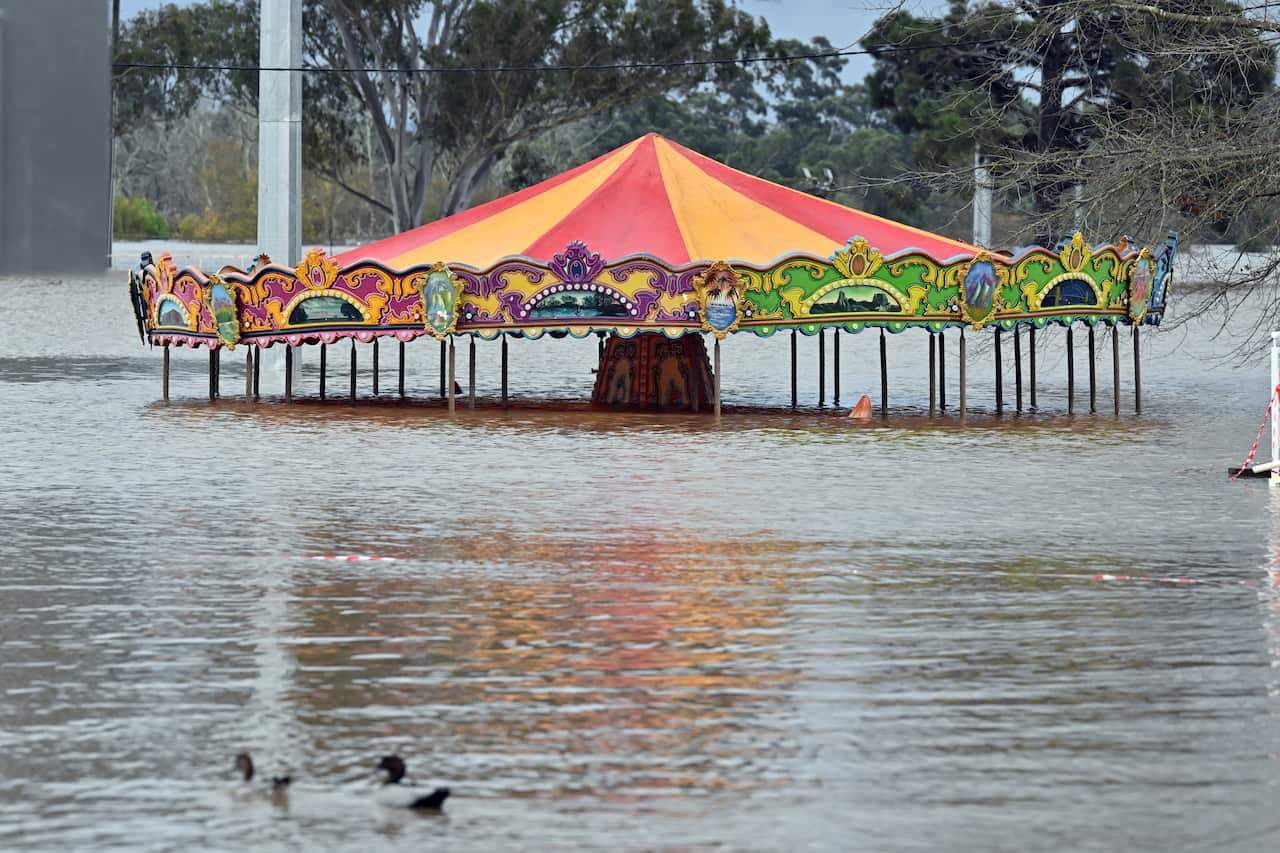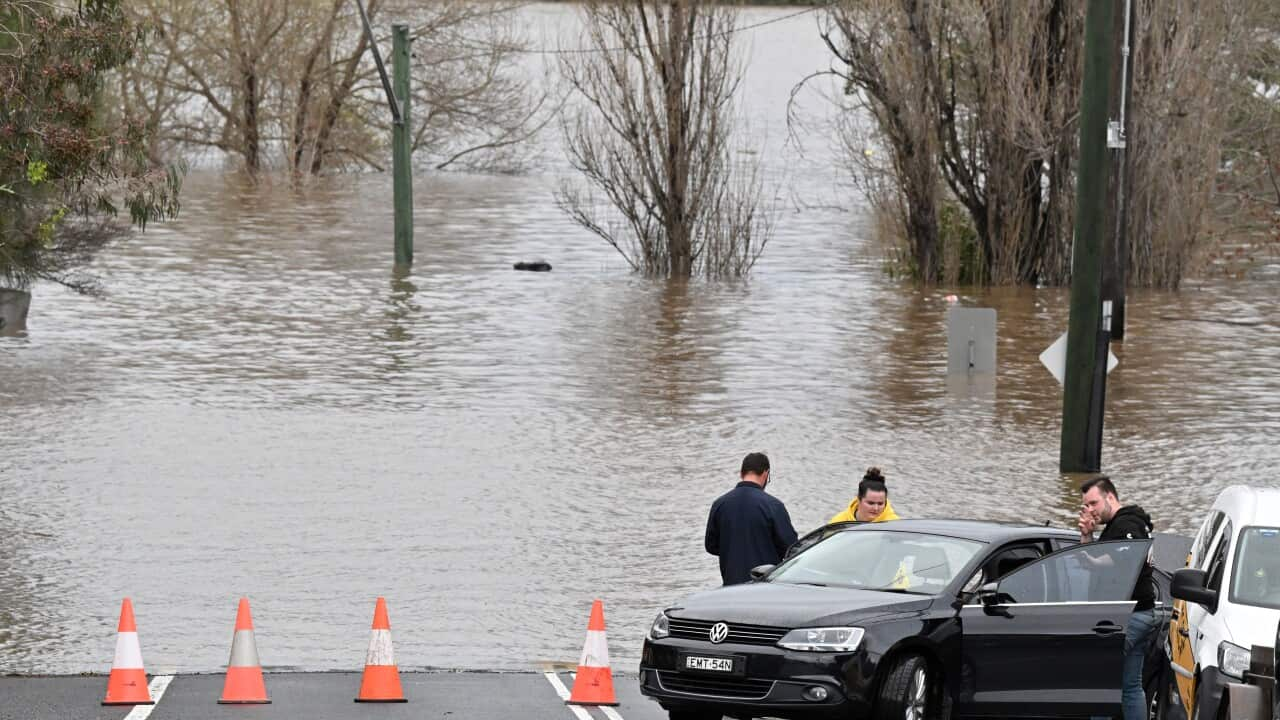Key Points
- Thousands of people have been ordered to evacuate as heavy rain continues across NSW
- The federal government says it's on standby when NSW declares a state of emergency.
Thousands of people have been ordered to evacuate as heavy rain continues across NSW, with the state again dealing with a major flood crisis.
The federal government says it's on standby when NSW declares a state of emergency, which would activate Commonwealth financial aid.
Scores of evacuation orders and warnings have been declared, mostly northwest of Sydney, where major flooding is occurring along the Hawkesbury and Nepean rivers at Menangle, North Richmond, Lower Portland and Windsor.
Areas are expected to approach or exceed flood levels of March 2021 and of March and April this year.
There are severe weather warnings of damaging winds, hazardous surf and heavy rain that may cause flash flooding in the Illawarra, Blue Mountains, Sydney Metropolitan and parts of Hunter and Central Coast districts.
Rain is forecast for the rest of the week and the flood risk will remain even after the wet weather stops, with saturated catchments likely to react quickly to any falls in the coming weeks.
NSW Premier Dominic Perrottet says the latest inundation could threaten more people and properties than previous floods.

Roads are submerged under floodwater from the swollen Hawkesbury River, in Windsor. Source: AAP / BIANCA DE MARCHI
He urged people to follow orders from the State Emergency Services (SES).
The SES has received more than 3,900 requests for help and conducted 85 rescues during the latest flood event.
"We anticipate another busy night," Commissioner Carlene York told the ABC.
NSW requested another 100 Australian Defence Force members, on top of the 100 who joined on Sunday, to help with sandbagging and door-knocking.
Evacuation centres have been set up across western Sydney at Canley Vale, Narellan, Gymea, Richmond, North Richmond and Castle Hill, and at Gosford on the Central Coast.
The SES responded to more than 400 requests for help overnight and performed about 20 flood rescues, and those numbers are expected to increase.
Federal Emergency Management Minister Murray Watt said he'd made it clear he was on standby to help NSW, with Prime Minister Anthony Albanese and Mr Perrottet discussing the situation overnight.
"We want to be very quick and thorough when it comes to providing recovery support to people as well," Mr Watt told the ABC.
Flood Recovery Minister Steph Cooke said 184 people had registered at evacuation centres and 68 people were in emergency accommodation on Monday.
She expects Commonwealth natural disaster declarations to be made within 24 hours, and communities will get help to recover from yet another flood.
"For many communities, this is the fourth flood that they have seen in less than 18 months," Ms Cooke said.
Camden Council deputy mayor Paul Farrow said the southwest Sydney community was heartbroken and fatigued by repeated flooding over the past 18 months.
"It's the worst case of deja vu you could possibly imagine," he told Sky News on Monday.

An amusement ride is seen inundated by floodwaters in Camden in South Western Sydney, Sunday, July 3, 2022. (AAP Image/Mick Tsikas) Source: AAP / MICK TSIKAS
"We're becoming used to it, unfortunately."
Risk Frontiers resilience general manager Andrew Gissing said community flood recovery can be hindered by repeat events.
"They are forced to continually pick up the pieces," he said.
Mitigation strategies and encouraging development in lower risk areas could reduce flooding in the future, he said.
Warragamba Dam began spilling on Sunday morning and, by evening, water was gushing over the wall at a rate of 515 gigalitres per day.
WaterNSW said the flow slowed overnight, down to 380GL/day, but the spill will depend on rain in the catchment on Monday.
The dam flows into the swollen Hawkesbury and Nepean rivers, which are above major flood levels in multiple areas.
Farmers have called for the dam wall to be raised to prevent floods damaging agricultural land.
NSW Farmers president James Jackson said the Sydney basin grows up to $1 billion of produce annually.
"How many floods do we have to have before we realise dams won't stop a flood but they can change the shape of it and reduce the damage significantly?" Mr Jackson said.
"It's very fast-moving water, it rips the ground away and destroys their crops."

